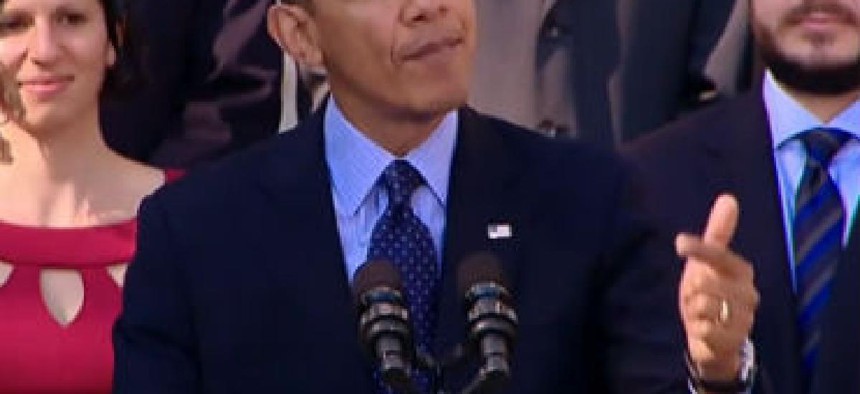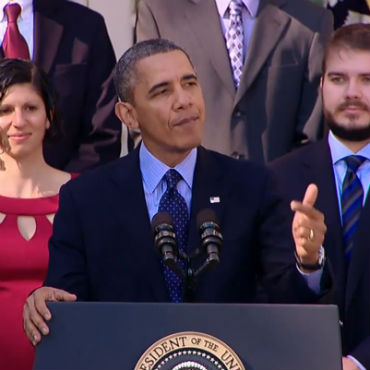Obama promises HealthCare.gov fixes, hawks low-tech workarounds

"Nobody's madder than me about the fact that the website isn't working as well as it should," the president declares, "which means it's going to get fixed."

The Obama administration is pressing for improvements to the buggy HealthCare.gov website that serves as the consumer-facing portal for health insurance applications under the 2010 health care law, but three weeks in, there is still no timetable for fixing the IT problems that have plagued the open-enrollment period.
In a White House speech on Oct. 21, Obama addressed the problem head on, saying, "Nobody's madder than me about the fact that the website isn't working as well as it should, which means it's going to get fixed."
The team in charge of HealthCare.gov at the Department of Health and Human Services promised a "tech surge" to address problems that have plagued users, including difficulty creating accounts and logging into the site. HHS offered its most detailed look at the problems in an Oct. 20 blog post and said the agency was turning to top programmers inside government and in the private sector to work on the site. Federal Chief Technology Officer Todd Park, a former technology executive with a specialty in health care applications, is pitching in, along with the Presidential Innovation Fellows.
"We're also putting in place tools and processes to aggressively monitor and identify parts of HealthCare.gov where individuals are encountering errors or having difficulty using the site, so we can prioritize and fix them," the post states.
There was no mention or confirmation by HHS of the back-end problems that are reportedly sending applications to insurance carriers with data errors, duplications and other problems.
An estimated 20 million unique visitors have been to HealthCare.gov, but only about 460,000 have been able to apply for coverage, with about half the applications coming from HealthCare.gov and half from the 15 jurisdictions that are running their own insurance exchanges. The disparity between total visitors and the number of applications suggests that some people have given up partway through the process. Obama said the information of those users has been retained in the system, and they will have the option to buy insurance through the exchanges.
"If you've already tried to apply through the website and you've been stuck somewhere along the way, do not worry," he said. "In the coming weeks, we will contact you directly, personally, with a concrete recommendation for how you can complete your application, shop for coverage, pick a plan that meets your needs and get covered once and for all.
It's not clear how the data from partially completed applications is being stored or how potential applicants will be contacted.
Obama asked people frustrated by repeated IT failures to try other application options. The front page of HealthCare.gov was updated to give new prominence to the telephone application process. "You'll find information about how to talk to a specialist who can help you apply over the phone or to receive a downloadable application you can fill out yourself and mail in," Obama said.
The mail-in option hasn't received much attention, but the Centers for Medicare and Medicaid Services, the unit of HHS directly responsible for implementing the law, planned for 6.2 million mailed applications out of a total of 20 million, in keeping with Congressional Budget Office estimates.
Serco, the Reston, Va.-based contractor responsible for processing paper applications and performing other back-office functions, got an $87 million amendment to its $114 million contract on Sept. 26, just days before the open enrollment period kicked off on Oct. 1, as FCW reported on Oct. 18. HHS would not comment on whether the department added capacity to process paper applications because of anticipated glitches in the computer system's launch.
Serco will also be involved in verifying the eligibility of applicants for subsidies and resolving complications that arise in individual applications and will have a limited role in operating phone banks to address technical questions that can't be answered by call-center workers taking applications over the phone. Serco did not respond to multiple requests for comment from FCW.
People seeking health insurance must enroll by Dec. 15 for coverage to begin on Jan. 1, 2014. CMS is working with contractors to establish a timeline for fixing the site, according to an article in the New York Times.
House Republicans are eager to probe how HealthCare.gov was designed and tested and whether administration officials had advance warning of the problems that occurred during the launch. The Energy and Commerce Committee is holding a hearing Oct. 24 on the subject. HHS Secretary Kathleen Sebelius had previously declined to testify but on Oct. 21 said she could be available the following week. For now, the House is planning on going ahead with its hearing this week, with or without Sebelius.
NEXT STORY: Carolyn Harvey: Saving money for HUD at GSA



